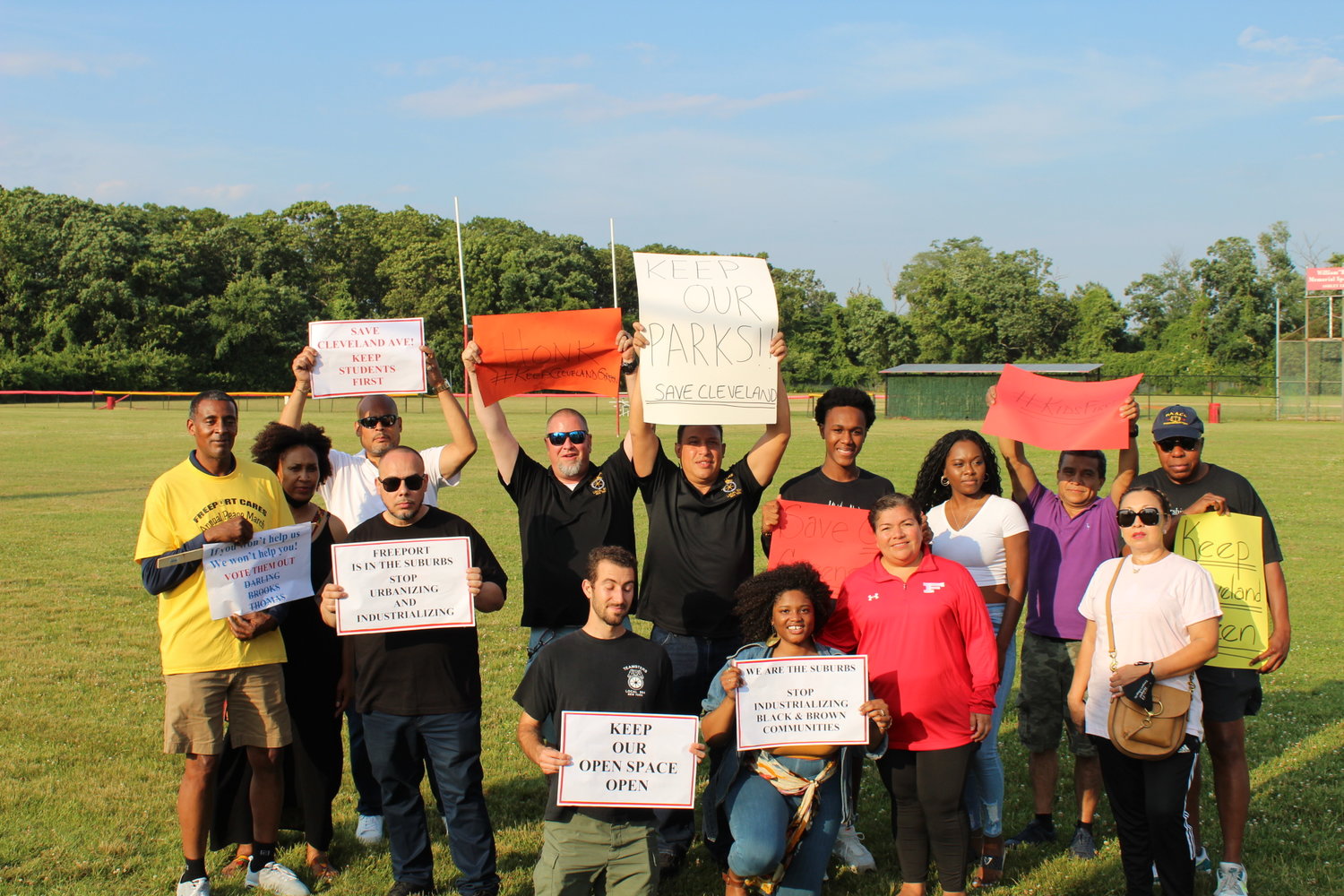Cleveland Ave. battle isn’t over
Field important to Freeport’s northeastern sector
Opposition to replacing the athletic field on Cleveland Avenue with an Amazon distribution warehouse was loudly expressed during a rally at the field on July 1.
The concerns raised by the speakers at the rally centered on the lessened accessibility to a large green space for residents of northern Freeport, the 24-hour truck traffic that will occupy the eastern end of the village and the high turnover rate of Amazon warehouse workers.
Additionally, there are concerns that the village government has repeatedly acted without transparency to the community. On top of it all, there is unsettled litigation between the Freeport Public Schools system and the village about who has the rights to the field.
The legal proceedings by the Village of Freeport government to remove the field’s parkland status are almost complete. The bill needed to make it happen passed in the state legislature, and is now on the desk of Gov. Kathy Hochul — which the protestors are urging her not to sign.
On the village’s side, Mayor Robert Kennedy, the trustees, and village counsel Howard Colton have assured the protesters that their access to the Cleveland field will not change until the village’s renovations of Cow Meadow Park are complete. But the promises of better facilities at Cow Meadow Park are not reassuring to the residents living above Merrick Road.
“The major problem about losing Cleveland Field is the Cow Meadow location,” said Lavette Hooks, whose three children graduated from Freeport High School. “In the summer there are no school buses to get kids to athletic practices. Some parents can bring their kids, but some kids walk to practice.”
Football season starts around the middle or end of July, Hooks explained, and if working parents cannot transport them, the children must get to practices on their own.
The Nassau Inter-County Express has no direct lines down to Cow Meadow from the high school, which is at the corner of South Brookside Avenue and Sunrise Highway.
The Herald researched transport from the Freeport High School area to Cow Meadow Park. Walking would take 49 minutes, but walking and taking two buses would consume 50 minutes.
Walking from the high school to the Cleveland field takes about 36 minutes, but if a student can catch a bus along Sunrise Highway to the Freeport LIRR station and walk down to Cleveland Avenue, the trip is 21 minutes.
During the school year, school buses carry the athletes to the Cleveland field. But, said Hooks, a student who has another academic obligation at the end of the day, or stays for extra help in a subject, will miss the bus, and must get to practice some other way. In that situation, the trek down to Cow Meadow Park becomes prohibitively far, even though it is only 2.5 miles away, versus the 1.8 miles to the Cleveland field.
“It’s going to discourage people,” said Sonia Dixon, one of the board members for the Freeport Village Fútbol Club, which has won several area championships and calls the Cleveland field home.
Dixon said that most of the youngsters on their teams live between Merrick Road and Sunrise Highway. The north-to-south journey to Cow Meadow Park, across Freeport’s most heavily trafficked streets, could make team participation impossible.
“We’re trying to do the best we can for these kids, keeping them off the streets,” said Dixon, “and this is why it’s sad to see that Cleveland Park might be taken away.”
The village posted on its Facebook page that it is requesting that NICE bus lines be added to accommodate students.
Those assurances do not address another issue: the types of jobs the warehouse would bring into the village, said Anthony Rosario, an organizer for Teamsters Local 804.
“About 100 of our members in 804 are UPS drivers and warehouse workers that live in this area,” said Rosario. “So that’s why we’re here, supporting our members.”
Rosario said the conditions for workers in Amazon warehouses cause a high incidence of workplace injuries due to the pressure to meet work quotas. He noted that the warehouses have an employee turnover rate of 150%, which means that an Amazon warehouse loses and replaces workers twice as fast as warehouses like Target or Walmart — a statistic confirmed in recent news reports.
“Amazon does not bring good jobs to a community,” Rosario said, adding that the business competition could depress smaller Freeport businesses, and that the traffic from delivery trucks would increase noise and air pollution.
The rally was organized by activist Kiana Abbady, program leader for New American Leaders, which has a specific outreach to “uplift New Americans — anyone who identifies closely with the immigrant experience — by tackling equity in representation,” according to its website.
In Freeport’s northeastern sector, the nine-acre Cleveland field is far larger than Bishop Frank O. White Park (Northern Park), the Liberty Park playground space on nearby Liberty Park Drive, or the practice field at John W. Dodd Middle School. Cow Meadow Park lies at Freeport’s southeastern extreme.
“So where do the kids go?” asked Scott Richardson, a lifelong Freeport resident who is president of the Freeport Red Raven Sports and Academics Club. “They come here.”
The green space is needed by the school system in addition to whatever the village provides at Cow Meadow Park, not instead of it, said Freeport School Board member Sunday Coward, who attended the rally.
Coward first served on the school board in 2000 and remembered the 1997 diagram that the school system had drawn up when the village first considered gaining ownership of Cow Meadow Park.
The diagram roughly sketches in some ideas for desirable athletic facilities.
“That was not in lieu of Cleveland field, it was in addition to,” Coward said. “It never was, ‘Get rid of this to go down there.’”
The school system has many teams, Coward said, filling the practice spaces at both the high school and the middle school and overflowing to Cleveland Avenue, where several teams can practice simultaneously.
Alfreda Hudson, who lived in northeastern Freeport since she started second grade in 1974, said the village government did not seek input from the residents of the area around Cleveland Avenue before proceeding with the change from a school and neighborhood field to a huge, busy warehouse.
“Anything you want to do that involves the community, you need to bring the community in it, get their opinion,” Hudson said. “Just be fair, transparent. You can’t do anything in the dark from the beginning and then expect people to get on board after the fact.”

 51.0°,
Overcast
51.0°,
Overcast 







